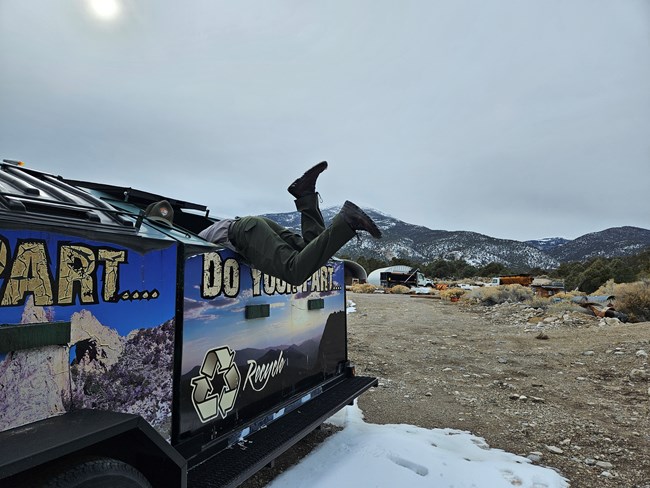
NPS / B. Mills Help Us Do the Right Thing: Achieving Sustainability at a Remote National Park.Sustainability is a word we hear a lot these days. When we hear it, some fairly specific images and sounds come to mind: the echoing call of a loon across a glassy lake, a swaying forest canopy, maybe a single, ageless bristlecone pine clinging to bare rock, defying death itself. In short, we often think of National Parks. But how do you take a sprawling natural area, bisect it with roads, trails, parking areas, and related infrastructure, add millions of people and their vehicles along with the accompanying noise, exhaust and waste, and with a straight face call it, sustainable? It’s a tough sell these days. But the NPS still believes that these places should buck the tide. If National Parks, even remote ones like this, can’t help to lead the way, then the generations that follow us will inherit a truly diminished legacy. Reduce and Reuse, but in the end, Recycle.Recycling appropriate materials, in the appropriate way, reduces carbon emissions up and down the production chain, lightens the load on methane-producing landfills, and helps to reduce the energy needs and carbon footprint associated with mining and processing raw materials. Recycling is something that we’d like to do better. Climatologists agree that our planet is rapidly approaching a tipping point which will determine how livable a planet we leave future generations. So, it’s something that we must do better. How can you help?To make recycling at Great Basin National Park an endeavor which actually serves the goal of sustainability, we need to get it almost perfect from the start. Recycling profit margins are low. Way out here, any recycling which arrives at the processing center as mixed material, even if just to a small degree, will likely end up in the landfill, as a cheaper option than sorting.The single most important thing that you can do to improve recycling at Great Basin National Park, is to stop, and consider, before you choose a bin for your trash. Please be discriminating when discarding your waste. If the bin is marked for aluminum, don’t toss in steel soup cans. If you are unsure whether an item belongs in a particular bin, and single-stream recycling is available where you live, consider taking that item back with you, or as a last resort deposit it into the regular garbage bins the park provides. Ironically, the best option could be the stuff heading to the landfill. Piles and Piles of PlasticLess than 10 percent of all the plastic ever produced has been recycled. Half of it goes straight to landfills and another fifth is mismanaged, likely ending up in rivers, lakes and oceans - some 14 million tons a year. Just tracking the number of plastic items that we use daily, just once, and then throw away, would, for most of us, prove daunting. The results globally have been devastating to fish and wildlife. The National Park Service is beginning the process of eliminating single-use plastic items from all of its operations. We will not succeed without your support.
This is not a pipedream. Even if not eliminated from our convenience-driven culture, plastic use can be greatly reduced by small steps like these. Enjoy your parks, responsibly, and help us to begin cleaning up the mess. |
Last updated: March 13, 2024
